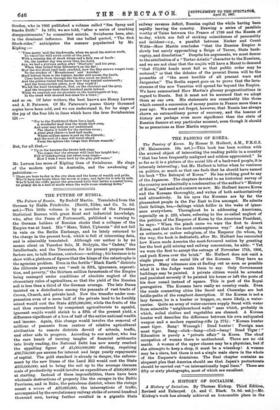THE PASSING OF KOREA.
The Passing of Korea. By Homer B. Hulbert, A.M., F.R.G.S. (W. Heinemann. 165. net.)—This book has been written with the avowed object of interesting the reading public in a country "that has been frequently maligned and seldom appreciated." In so far as it is a picture of the social life of a backward people, it is intensely interesting ; but Mr. Hulbert is bitter when he ventures On politics, so much no that one feels that he should have named his book "The Betrayal of Korea." He has nothing good to say of the Japanese. The chapters devoted to an historical survey of the country are admittedly a condensation of the author's " History of Korea," and need not concern us now. Mr. Hulbert knows Korea and the Koreans thoroughly, and writes of both authoritatively and attractively. In his eyes the Koreans are by far the pleasantest people in the Far East to live amongst. He admits their failings, too,—failings which follbw in the wake of ignor- ance everywhere. Throughout he is addressing Americans, especially on p. 223, where, referring to the accalled neglect of the petition of the Emperor of Korea by the American President, he says:. " When the pinch came we were the first to desert Korea, and that in the most contemptuous way." And again, in an estimate, or rather eulogium, of the Emperor (to whom, by the way, the book is dedicated), after Mr. Hulbert has recounted how Korea made America the most-favoured nation by granting her the best gold mining and railway concessions, he adds " Yet we were the first to accept the outrage of November 17th, 1905, and push Korea over the brink." Mr. Hulbert does not omit a single phase of the social life of the Koreans. They have no lawyers. Many witnesses aim at finding out as soon as possible what it is the Judge wants them to say. Only Government buildings may be painted. A private citizen would be arrested and punished severely if he painted his house or left the posts of his door round instead of square. This is part of the Royal prerogative. The Koreans have really no country roads. Even the roads connecting cities like Seoul and Chemulpo are but bridle-paths of the roughest description. If the Korean is not a lazy farmer, he is a hunter or trapper, or, more likely, a water- carrier. Quite an army of water-carriers supply Seoul with water from miserable "neighbourhood wells" near which, probably in which, soiled clothes and vegetables are cleaned. A Korean hunter well describes the difference between his own antiquated weapon and a modern repeating-rifle (p. 275): "Korean hunter meet tiger. Bang ! Wreough ! Dead hunter ! Foreign man meet tiger. Bang—click—bang—click—bang ! Dead Tiger ! " Education is purely a "private affair" in Korea. The chief occupation of woman there is motherhood. There are no old maids. A woman of the upper classes may be a physician, but if she attempts to keep a shop, it must be a wineshop ! A woman may be a slave, but there is not a single male slave in the whole of the Emperor's dominions. The final chapter contains an eloquent plea that America should see that Japan's protectorate should be carried out "on internationally legal lines." There are fifty or sixty photographs, most of which are excellent.


























































 Previous page
Previous page